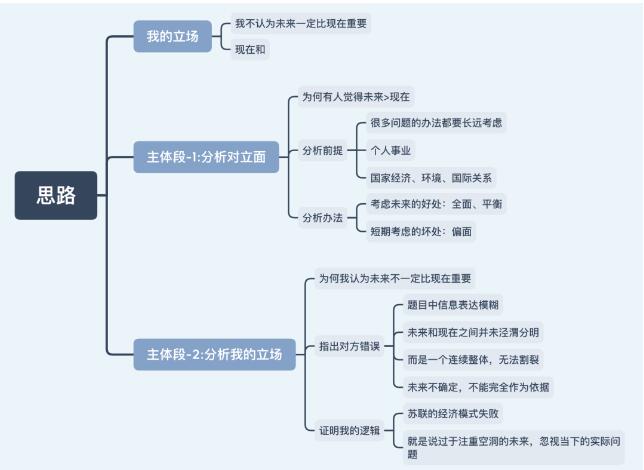An American film actor John Wayne said: "Tomorrow is the most important thing in life." How is it important for individuals and countries to think about the future rather than focus on the present?
题目大意
美国演员John Wayne说明天是生命中很重要的事情。对个人和国家而言,关注未来比关注当下是否更重要?
思路解析
这道题目的问题和常见的4种雅思题型不同;但是依然可以借用常用的答题思路;
问题是How is it important for individuals and countries to think about the future rather than focus on the present? 关注未来和关注当下相比,有多重要?—— 即答案有两种,关注未来比当下更重要;或关注未来并不必关注当下重要;—— 这样来看这道题的话,等同于我们常见的agree disagree的,或discuss both views的题型,文章中分别就两种可能性予以讨论即可;
结构即是:我的立场不认为关注未来比关注现在更重要;主体段-1:分析对立面(为何有人会觉得未来更重要);主体段-2:分析我的逻辑(为何我觉得未来并不比现在更重要)
反驳的理由:从题目的表述中找出其漏洞。1)today和tomorrow定义模糊,两者没有明确界限,以至于无法将问题按照清晰的时间节点分开讨论;2)未来是一个不确定的概念,这种不确定性令所有计划都不可靠;
提纲
写作示范
While there is an opinion that tomorrow is the most important thing in life, I tend to disagree with this claim – it is simplistic to venerate future problems over the ones facing us today if we cannot clarify the difference between the two ambiguous terms.
Indeed, it is not difficult to for some people to assume that future deserves higher priority over current issues. From this perspective, many conundrums frustrating individuals and governments should be addressed from a long-term perspective; the solutions would be holistic should the potential ramifications be taken into consideration. Problems regarding this statement consists of personal career prospects, the balance between economic development and the environment, or the relationship between countries – any schemes would be deemed interim or even short-sighted if it only focused on current plights.
The problem with aforementioned reasoning, in my opinion, is the misinformation of the interpretation of today and tomorrow. It looks to me that there doesn’t exist a precise dividing point between so-called ‘the present’ and ‘future’; rather, the difference should be understood as a continuum not a binary opposition – any plans in relations to personal or national problems should be placed at one point along this continuum rather than in one of two boxes. Another argument against the utterance in the topic it its oblivion to the uncertainty of future, which makes many long-term schemes unsustainable due to unforeseeable changes in the future. One notorious example can be seen in the failure of socialism revolution in previous Soviet Union, with its strategies focusing more on abstract future while ignoring many substantial problems at the moment.
It is my conclusion therefore, it is oversimplified to place primary emphasis on future as opposed to current issues without scrutinizing the context where the discussion take place.


